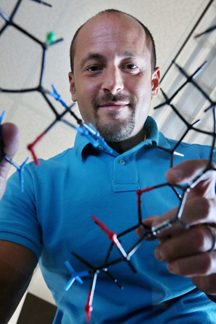Phil Baran Wins MacArthur Fellowship
By Mika Ono
Chemist Phil S. Baran of The Scripps Research Institute (TSRI) has won a 2013 MacArthur Fellowship, sometimes called a “genius grant.”
Baran, who is a professor at TSRI and an alumnus of TSRI’s graduate program, will receive a $625,000 fellowship over five years from the John D. and Catherine T. MacArthur Foundation. The grant comes with no specific obligations or reporting requirements.
“Phil is an extraordinary chemist,” said Michael A. Marletta, president and CEO of TSRI and himself a 1995 recipient of a MacArthur Fellowship. "It is very difficult to transform a mature discipline like chemistry but Phil has done this and done it in a very short period of time. His intellect, drive and creativity exemplify chemistry at The Scripps Research Institute. All of us at Scripps are very proud of him and I personally am very happy to call Phil my colleague."
"This is a wonderful recognition of Phil's remarkable accomplishments and future things yet to come,” said Dale Boger, who is the Richard and Alice Cramer Professor and Chair of the Department of Chemistry at TSRI. “We are thrilled for Phil—he is the real deal."
MacArthur Fellowships are awarded to individuals who have shown extraordinary originality and dedication in their creative pursuits and a marked capacity for self-direction. Individuals cannot apply for the award; they must be nominated. Typically, 20 to 30 fellows from a wide variety of fields are selected each year.
Baran’s contributions have been in the area of synthetic organic chemistry, where he has pushed boundaries with innovative solutions to synthetic problems. With members of his team at TSRI, he has developed new techniques that dramatically reduce the time, complexity and cost of synthesizing natural products with pharmaceutical potential for conditions including cancer, heart disease and vision loss.
Baran, a graduate of NYU (1997) and TSRI (2001), joined the TSRI faculty in 2003 after a National Institutes of Health-funded postdoctoral fellowship at Harvard University in the laboratory of Nobel Laureate E. J. Corey. Baran is the author of more than 100 papers and an interactive textbook, The Portable Chemist’s Consultant: A Survival Guide for Discovery, Process, and Radiolabeling available from iTunes. He is also co-founder of Sirenas Marine Discovery.
One of the nation’s largest independent foundations, the MacArthur Foundation supports creative people and effective institutions committed to building a more just, verdant, and peaceful world. In addition to selecting the MacArthur Fellows, the Foundation works to defend human rights, advance global conservation and security, make cities better places and understand how technology is affecting children and society.
For more information on Baran and his lab, see www.scripps.edu/research/faculty/baran. For more information on the MacArthur Foundation and its fellows program, see www.macfound.org and www.macfound.org/programs/fellows.
Send comments to: press[at]scripps.edu














